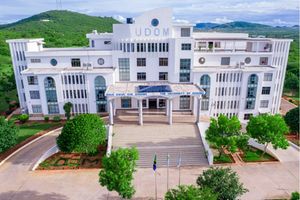Kiswahili gives new impetus to EA unity

ShyRose Bhanji (L)
What you need to know:
The majority of MPs unanimously agreed that elevating Kiswahili to that status was long overdue. Other Eala members behind the push were Mr Abubakar Zein and Abdullah Mwinyi from Tanzania.
Arusha. The journey to making Kiswahili the official language of the East African Community (EAC) and the Great Lakes Region has been long. It finally took its last stop on Thursday when the regional parliament passed a resolution to seal the deal.
Over the years, Kiswahili has been considered the lingua franca of the region. Initially, it was a language used for communication during early trade between people of the East African coast and the outsiders from overseas. That was some centuries ago.
In fact, it was much to the benefit of the early visitors rather than the typical natives. The latter were more concerned about their day to day survival, largely at the mercy of nature.
Traders from the Arabian peninsula, the Persian Gulf and as far as India and beyond were in dire need of a language to facilitate their trade in the hinterland of East Africa, be it in ivory, slaves, minerals and other items in exchange for their merchandise.
Then came the fairly equipped explorers, missionaries and nature lovers from Europe who were even keener to embrace the heart of Africa given the continent’s huge natural resources. They did not want to do this without dislodging the Arabs and Asian merchants and their administrations.
The whites, some with Bible in hand and a rifle on the shoulder, could hardly communicate with the natives and had to borrow words from the nascent Kiswahili through some traders they encountered.
It was at this juncture that one of the first known explorers from German to visit the region Ludwig Krapf compiled the first Kiswahili grammar, back in 1848 at Rabai Mpya near the present day Mombasa.
“This shows how important, strategic and relevant Kiswahili was, and how it became a significant platform from a socio-economic development point of view,” said Ms ShyRose Bhanji, a member of the East African Legislative Assembly (Eala) from Tanzania.
Last week, she tabled a motion in the House seeking the amendment of the Treaty for the Establishment of the East African Community (EAC) in order to make Kiswahili one of the official languages of the EAC after English.
The majority of MPs unanimously agreed that elevating Kiswahili to that status was long overdue. Other Eala members behind the push were Mr Abubakar Zein and Abdullah Mwinyi from Tanzania.
MPs appreciated its role in facilitating communication among the people of the EA region. It is already one of the official languages of the African Union (AU).
“It has been my long desire, dream and ambition to promote Kiswahili as one of the official languages of the EAC,” Ms Bhanji told The Citizen at the end of the Eala session on Thursday, which debated the motion and passed a resolution to urge the Summit to amend the relevant EAC Treaty.
“Embracing Kiswahili language is also bound to increase the participation of the people of EA in the affairs of the Community as well as promote African culture,” Mr Zein pointed out, while Mr Mwinyi maintained that Tanzania had embraced it because of its unifying factor.
From Uganda, the Deputy Prime Minister, who is also the minister for EAC Affairs, Mr Kirunda Kivejinja, urged the motion to be fast-tracked n “in the shortest time possible” to the Summit of EAC Heads of State for consideration.
But he said no one should be blamed for the delay.
“Kiswahili has not been popular in Uganda because it was associated with slave trade and all the bad things the whites disliked in those days,” he said in response to a debate on how the language can be legalised as an official communication channel by the Community.
He added: “When the whites came they needed change and so Ugandans embraced English while sticking to their vernaculars. Kiswahili was despised because it was associated with the Arabs.”
It emerged that although Kiswahili is not as popular in Uganda compared to four other sister countries in the EAC, Tanzania, Kenya, Burundi and Rwanda, it was nevertheless a compulsory subject in the education system. In much recent years, politicians there have used it to address rallies.
As has been expected, legislators from Uganda sought clarification on the spirited drive to legalise Kiswahili, the language not well spoken in their country despite their centuries’ old traditional kingdoms having communicated with the outside world before many parts of the region.
“The Assembly needs to be practical to acknowledge that there are some partner states such as Uganda that have a large population that does not speak Kiswahili,” lamented Dora Byamukama, a legislator from Uganda as the debate raged on.
She said the EAC Treaty only mentions Kiswahili as a lingua franca that should be developed as a community-wide language. She hinted that in order for Ugandans to embrace the language like their counterparts in the bloc, a lot of effort has to be done to develop the language in that country.
Historians say Kiswahili originated in Zanzibar and Mombasa and along the entire coast of East Africa where there were settlements that attracted the visitors and traders from overseas, and natives from the hinterland.
Much of the records were from the peak of the slave trade in the mid-1800s and the establishment of the Oman Sultanate along the coast around that time to the present day. But the language could have existed even before considering the Shraz settlements at Bagamoyo (Kaole) and Kilwain the 12th century or thereabouts.
Tanganyika under the German rule, then known as Deutsche Ostafrika, designated Swahili as a colony-wide official administrative language way back in 1886. The British did not do so in Kenya even though they made moves in that direction.
The British and Germans both sought to facilitate their rule over colonies where the inhabitants spoke dozens of different languages and so the colonial authorities selected a single local language which they hoped the native could find acceptable. Swahili was the only good candidate in the two colonies.
In the aftermath of the First World War in which Tanganyika fell into British hands, there was increased resolve to institute Swahili as a common language for primary education and low-level governance throughout their East African colonies – Tanganyika, Uganda, Zanzibar and Kenya.
Ms Bhanji said the language played a key role in uniting the people of EA from the pre-independence days and that even the colonial administrators did not lose sight of that fact “from the very early days”.
Tanzania took up Kiswahilih as a national and official language way back in the early 1960s, followed by Kenya in the 1970s and Uganda in much recent years. It is also widely spoken in various countries in eastern, central and southern Africa, from Somalia in the Horn of Africa to parts of Mozambique and Malawi to the south and from Comoro Islands in the Indican Ocean to the eastern part of DR Congo.


